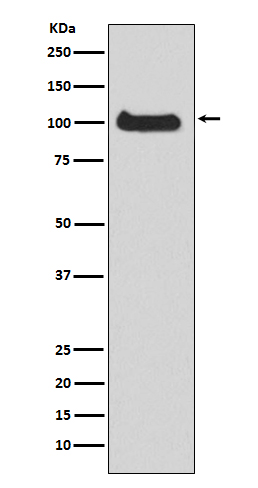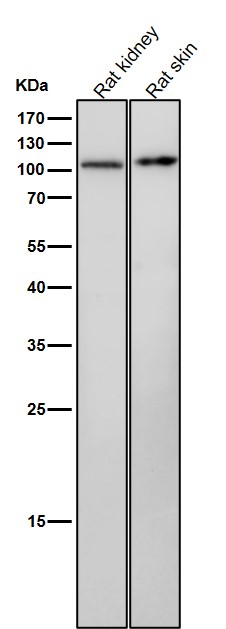


| WB | 咨询技术 | Human,Mouse,Rat |
| IF | 咨询技术 | Human,Mouse,Rat |
| IHC | 咨询技术 | Human,Mouse,Rat |
| ICC | 技术咨询 | Human,Mouse,Rat |
| FCM | 咨询技术 | Human,Mouse,Rat |
| Elisa | 咨询技术 | Human,Mouse,Rat |
| Aliases | nPKC D1; nPKC mu; nPKCD1; nPKCmu; PKCM; PKCmu; PKD1; PRKCM; PRKD 1; Prkd1; Protein kinase C mu; Protein kinase C mu type; Serine/threonine protein kinase D1;;PKC mu |
| WB Predicted band size | 102 kDa |
| Host/Isotype | Rabbit IgG |
| Antibody Type | Primary antibody |
| Storage | Store at 4°C short term. Aliquot and store at -20°C long term. Avoid freeze/thaw cycles. |
| Species Reactivity | Human,Mouse,Rat |
| Immunogen | A synthesized peptide derived from human PKC mu |
| Formulation | Purified antibody in PBS with 0.05% sodium azide,0.05% BSA and 50% glycerol. |
+ +
以下是3篇与PKCμ(又称PKD1)抗体相关的文献摘要信息,按规范格式整理:
---
1. **文献名称**: "Protein kinase D regulates vesicular transport by phosphorylating phosphatidylinositol 4-kinase IIIβ at the Golgi apparatus"
**作者**: Hausser A, et al.
**摘要**: 本研究利用PKCμ特异性抗体,通过免疫沉淀和免疫荧光技术证实PKD1在高尔基体囊泡运输中的作用。研究发现PKD1通过磷酸化磷脂酰肌醇4激酶IIIβ调控分泌通路,抗体检测显示PKD1在高尔基体定位的动态变化。
---
2. **文献名称**: "Role of protein kinase C μ in dopamine release from Parkinson's disease model neuronal cells"
**作者**: Zhang Y, et al.
**摘要**: 文章使用PKCμ抗体进行Western blot和免疫组化分析,发现帕金森病模型中PKD1表达水平异常升高。实验表明PKD1通过调控突触蛋白磷酸化影响多巴胺释放,抗体特异性验证通过siRNA敲低实验确认。
---
3. **文献名称**: "Antibody-based profiling of protein kinase D family reveals distinct isoform-specific signaling roles"
**作者**: Rozengurt E, et al.
**摘要**: 本研究系统比较了针对PKD家族(包括PKD1/PKCμ)的不同抗体的特异性。通过敲除细胞系验证抗体可靠性,并揭示PKD1在NF-κB信号通路中的独特作用,强调选择高特异性抗体对功能研究的重要性。
---
**备注**:PKCμ(Protein Kinase C μ)现被归类为PKD(Protein Kinase D)家族成员,正式名称为PKD1.文献检索建议同时使用"PKD1"和"PKCmu"作为关键词以覆盖早期研究。如需全文链接或补充文献可进一步说明。
The protein kinase C mu (PKCμ), also known as protein kinase D1 (PKD1), is a serine/threonine kinase belonging to the PKD family, initially classified as an atypical PKC due to structural similarities. Unlike classical PKC isoforms, PKCμ/PKD1 contains a pleckstrin homology (PH) domain and a cysteine-rich motif, enabling its role in membrane trafficking, cell survival, and signal transduction. It is activated by diacylglycerol (DAG) and phosphorylation via PKC isoforms, responding to stimuli like oxidative stress, G protein-coupled receptors (GPCRs), and growth factors.
PKCμ antibodies are essential tools for studying its expression, localization, and activation in diseases, particularly cancer. Overexpression of PKCμ is linked to tumor progression, metastasis, and resistance to therapy in cancers such as prostate, breast, and pancreatic malignancies. These antibodies enable detection of total PKCμ or its phosphorylated forms (e.g., at Ser744/748 or Ser916), reflecting activation status. Applications include Western blotting, immunohistochemistry, and immunofluorescence, aiding research on PKCμ's role in cellular processes like apoptosis, angiogenesis, and immune regulation. Commercial PKCμ antibodies are typically validated for specificity using knockout controls or siRNA-based approaches. Ongoing studies explore PKCμ as a therapeutic target, with inhibitors under investigation for oncologic applications.
×